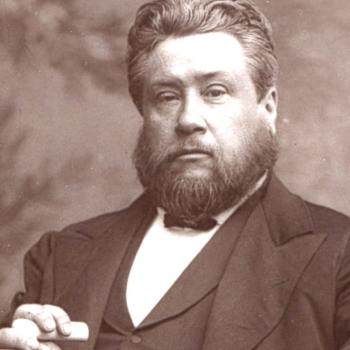
Personally, I was quite surprised by the level of passion he expressed in his recent talk at the DGM conference. He quoted a now infamous passage from Steve Chalke – a very well-known and influential member of the UK’s Evangelical Alliance – which claims that a traditional evangelical view of penal substitution is nothing more than “cosmic child abuse.” Do you agree with Piper’s choice of these two issues as ones to stand up for vigorously? Do you also think he was fair to then boldly declare that he believed that Chalke’s words were blasphemy? Do you agree with that assessment?
Wayne
Evangelicals in the academic world battled against liberals in scholarly writings about this issue fifty years ago, and I think that evangelicals like Leon Morris won the argument and won the theological battle. Now Chalke is giving away the hard-won victory. He is giving away the heart of the Gospel. I would never agree to give my approval to anyone who denies penal substitutionary atonement to be an elder at a church I attended, or to be a pastor or Bible teacher, or to teach at a theological seminary where I had influence on the appointment.
Adrian
Wayne
I have kept this portion of the interview short due to the vital importance of the subject we were discussing. I plan a major post sharing a recent talk I gave on the subject of the Atonement sometime in the New Year – probably as part of my plans to revive and complete my series on the
Together for the Gospel Statement.
of Steve Chalke
, and which I asked Wayne Grudem about.
“The Son of God, Jesus Christ, came into the world, lived a perfect life, died to bear the penalty for our sins, absorbed the wrath of God that hung over us, rose from the dead triumphant over death and Satan and all evil, so that all who receive Jesus as the Savior, Lord, and Treasure of their lives would be forgiven for Christ’s sake, counted righteous in Christ, and fitted to know and enjoy God forever.
Oh, how I wish that at least here, at the center of the Gospel, there would be common ground among those who claim to be followers of Jesus today. But that’s not the case, and one of the reasons is that the postmodern mind, inside and outside of the church, has no place for the biblical truth of the wrath of God. And, therefore, it has no place for a wrath-bearing Savior who endures God’s curse that we might go free. One of the most infamous and tragic paragraphs written by a church leader in the last several years heaps scorn on one of the most precious truths of the atonement: Christ’s bearing our guilt and God’s wrath.
The fact is that the cross isn’t a form of cosmic child abuse—a vengeful Father, punishing his Son for an offense he has not even committed. Understandably, both people inside and outside of the Church have found this twisted version of events morally dubious and a huge barrier to faith. Deeper than that, however, is that such a concept stands in total contradiction to the statement “God is love”. If the cross is a personal act of violence perpetrated by God towards humankind, but borne by his Son, then it makes a mockery of Jesus’ own teaching to love your enemies and to refuse to repay evil with evil. (Steve Chalke and Alan Mann, The Lost Message of Jesus [Grand Rapids: Zondervan, 2003], pp. 182-183.)
With one cynical stroke of the pen, the triumph of God’s love over God’s wrath in the death of his beloved Son is blasphemed, while other church leaders write glowing blurbs on the flaps of his book. But God is not mocked. His Word stands firm and clear and merciful to those who will embrace it:We esteemed him stricken, smitten by God, and afflicted. But he was wounded for our transgressions; he was crushed for our iniquities; upon him was the chastisement that brought us peace, and with his stripes we are healed. All we like sheep have gone astray; we have turned every one to his own way; and the Lord has laid on him the iniquity of us all. . . . It was the will of the Lord to crush him; he has put him to grief. (Isaiah 53:4-6, 10)Christ redeemed us from the curse of the law by becoming a curse for us—for it is written, “Cursed is everyone who is hanged on a tree.” (Galatians 3:13)
For God has done what the law, weakened by the flesh, could not do. By sending his own Son in the likeness of sinful flesh and for sin, he condemned sin in the flesh. (Romans 8:3)Whose sin? My sin. Whose flesh? Jesus’ flesh. Whose condemnation? God’s condemnation.In our present fallen, rebellious condition, nothing — I say it again carefully — nothing is more crucial for humanity than escaping the omnipotent wrath of God. That is not the ultimate goal of the cross. It is just infinitely necessary—and valuable beyond words.The ultimate goal of the cross, the ultimate good of the Gospel, is the everlasting enjoyment of God. The glorious work of Christ in bearing our sins and removing God’s wrath and providing our righteousness is aimed finally at this: “Christ also suffered once for sins, the righteous for the unrighteous, that he might bring us to God” (1 Peter 3:18). Jesus died for us so that we might say with the psalmist, “I will go to the altar of God, to God my exceeding joy” (Psalm 43:4). (John Piper)
 “We do not, however, insinuate that God was ever hostile to him or angry with him. How could he be angry with the beloved Son, with whom his soul was well pleased? Or how could he have appeased the Father by his intercession for others if He were hostile to himself? But this we say, that he bore the weight of the divine anger, that, smitten and afflicted, he experienced all the signs of an angry and avenging God.”
“We do not, however, insinuate that God was ever hostile to him or angry with him. How could he be angry with the beloved Son, with whom his soul was well pleased? Or how could he have appeased the Father by his intercession for others if He were hostile to himself? But this we say, that he bore the weight of the divine anger, that, smitten and afflicted, he experienced all the signs of an angry and avenging God.”
(Calvin, J., & Beveridge, H. (1997). Institutes of the Christian Religion. Translation of: Institutio Christianae Religionis; Reprint, with new introd. Originally published: Edinburgh: Calvin Translation Society, 1845-1846. (II, xvi, 11). Oak Harbor, WA: Logos Research Systems, Inc.)
-
-
-
L – Limited Atonement – In this post, I begin talking about Limited Atonement by asking first what atonement is and addressing Chalke’s viewpoint.
-
Arguing About the Atonement – Here I address the concerns some have about how the Trinity can reject itself.
- Mark Driscoll on the Atonement
-
Other Sites
- The Atonement Debate – Hosted by the UK’s Evangelical Alliance.
- Steve Chalke Explains Himself
- Penal Substitutionary Atonement at Monergism.com
- The Nature Of The Atonement – By Phil Johnson
- No Punishment Required? – By Phil Johnson
- Spurgeon on the Atonement – The Prince of Preachers is at his best and most relevant to today here.
- Daniel Strange on the Atonement
- Martyn Lloyd-Jones on the Atonement
Continued in part seven . . .

















